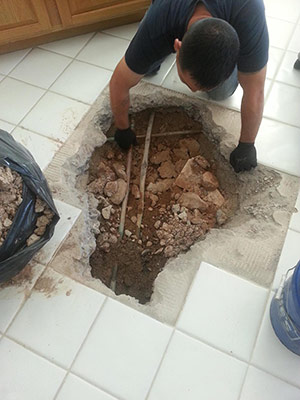Underground Leak Detection
Are you experiencing signs of a leaking pipe system like increased water bills, water noises running in your walls or a hot spot in your flooring? Or worse yet, are you ignoring these critical signs? Slab leaks are typically pinhole leaks that occur within or underneath your foundation as the concrete begins to deteriorate. This may not sound like much more than a nuisance, but these pinhole leaks can evolve; water pushes toward the path of least resistance leading to foundation cracks, water discoloration, warped flooring, mildewed carpet and various other types of expensive damage.
Slab Leak Symptoms:
- Increased Water Bills – if there’s no visible evidence of a leak, it could be a slab leak.
- Cracks in Walls and Ceilings – may indicate that the home foundation has moved or cracked as a result of a slab leak.
- Mildew or Excessive Moisture – on or under carpet might indicate a crack in the foundation and leaking pipes.
- Running Water in Walls or Flooring – can be an indicator of a slab leak.
- Floor Hot Spots – where hot water lines may be leaking and causing temperature differentiation.
- A Continuously Clogged Drain – it is possible that a sewer line pipe under the slab has separated, cracked or broken due to the movement of the slab floor.
HOT AND COLD DOMESTICE WATER LINES-OPTIONS FOR THE REPAIR OF SLAB LEAKS-LEAKS IN WALLS/CEILINGS
Option 1: Jackhammering
- Only fixes a section of the pipe, and the remaining line is subject to fail-causing further repairs.
- Not recommended.
- $900-$1200 average cost. Technicians will quote based on your circumstances.
- Pros: Inexpensive and straightforward
- Cons: Messy, intrusive, the high failure rate on the remaining pipe left underground.
Option 2: Single Line Reroute
If there is a corroded pipe in the slab, it could be deteriorating from harsh soil or water. Re-routes lift lines from under the slab/ soil up and over into walls and ceilings.
We need to know where both ends of the pipe are before re-routing. We must open the pipe and verify if it is a single line under the slab from one end to the other- The price depends on how many drywall cuts and patches/ length of pipe.
- 50 year-Copper Manufacturer's Warranty
- 25-year-Uponor Pex Manufacturer’s Warranty
- Epoxy Coating Whole House (see Item #3 below)
- 10 year-Workmanship Warranty
- Does not include drywall texture or paint.
- $1500-1700 average cost. Technicians will quote based on your circumstances.
- Pros: Affordable, good warranty
- Cons: Messy, intrusive, not always appropriate.
Option 3: Epoxy lining
Begins with cutting both ends of the exposed pipe to pressure test and see how big the leak is- and determine the variables and capabilities for epoxy.
- $3750 average cost.
- Pros: Saves money and time. Least intrusive. Scientifically the best materials and carries a lifetime warranty to the original owner, then have a transferrable warranty to the new owner for a 10- year warranty.
- Cons: Not all pipes are candidates for epoxy. The line must be cleaned to pristine condition.
Option 4: Sleeving
High temp and high strength material. Begins with a borescope camera to locate any corrosion within the pipe from previous repairs, pipe bends, and oval vs. round conditions. The line needs to be abrasively cleaned to prep for sleeving.
- $3950 average cost
- Pros: Less intrusive, least reconstruction. High flow rate. 25-year manufacturer’s warranty & a 10- year Brinks workmanship warranty.
- Cons: Hard to obtain the product. It takes a few weeks to obtain the materials if not in stock.

If you suspect you’re experiencing a slab leak, the sooner you act the better!
Call San Diego Leak Detection Now
If you think you’re experiencing a slab leak on your property, contact San Diego Leak Detection immediately for an investigation of your situation including a written estimate of the leaking system and the most effective repair available. And remember, with any leak, the sooner you act the better!Best San Diego Leak Detection FAQs
-
Are slab leaks covered by homeowner's insurance?
This is one of the first questions that most of our clients ask us. Slab leak detection and repair can be quite costly, so it is only natural that you be concerned about who will pay. The answer to this question will depend on a number of factors, most notably, your particular insurance company and the details of your coverage. You'll need to check with your insurer to find out the specific details of what your policy will and will not cover.
In our experience, most insurance companies will cover slab leak detection to determine the precise location of the leak. Once that is established, they can then make a determination about covering the costs of the repairs. From what we have seen, most insurance companies will cover the repairs, though again, you'll have to check with your provider to be sure.
-
What type of water damage is covered by homeowner's insurance?
As with the previous question, you'll need to contact your insurance company to determine exactly what will and will not be covered. However, there are some general commonalities most insurers share. In most cases, insurance companies will pay for water damage that results from floods, storms, sewer backup and overflow, and burst pipes, though there can always be exceptions.
Typically, homeowner's insurance will not cover gradual water damage, like from a slowly leaking pipe. However, you may be able to get coverage for a gradual leak if the damage was the result of other repairs that were covered under your policy. Once again, contact your insurer to find out the specific details of your coverage.
-
Does a home warranty cover slab leaks?
If you recently purchased a home that was not brand new, you likely purchased a home warranty to cover any unexpected issues in your first year of ownership. With all the stress of purchasing a house, many people see the warranty as somewhat of an afterthought, often opting for the minimum coverage. If you chose this option, your home warranty may not cover slab leaks.
If, on the other hand, you signed up for a more robust plan, your home's foundation may be included under the warranty coverage. This isn't always the case, though, so be sure to check with your warranty provider for clarification. Even if your home warranty doesn't cover slab leaks, your homeowner's insurance likely will, so there is no need to worry about how you will cover the costs.
-
How much do slab leaks cost to fix?
The cost of slab leak repairs can vary widely, depending on the scale and scope of the job. In general, you can expect to pay somewhere between $1,000 and $5,000 for high-quality workmanship. As you might expect, small leaks will typically be less costly to repair than larger ones. The sooner you are able to catch the leak, the easier it will be to fix, so you can also save money by identifying the problem as quickly as possible.
It is important to note that the location of the leak will play a major role in the overall cost of the project. If the plumber will need to cut through the floor of your home in an awkward area, like underneath your dishwasher or behind your fridge, the cost will be much higher than it would for a leak in the middle of open floor. This is because there will be a lot more labor involved in accessing the leak to complete the repairs.
-
How long does it take to repair a slab leak?
The amount of time your slab leak repair will take will depend on the difficulty of accessing the leak and the extent of the damage. In most cases, experienced plumbers can complete all of the necessary repairs in about two days. This includes digging down to the leak site, repairing the leak and restoring your home's foundation.
However, that two-day time frame doesn't include any time you'll need to restore your flooring, wallpaper, paint, or baseboards. Depending on the finishes you have in your home, you may need to bring in a contractor to complete these final touches.
-
What causes slab leaks?
There are a number of factors that can contribute to slab leaks, but these are some of the most common causes:
Ground Shifts - Over time, your house will continue to settle over its foundation. The weight of the house pushes down on the foundation and into the ground below. That buildup of pressure can lead to shifts in the ground underneath your home, making the support less stable. This can bend or crack pipes, resulting in slab leaks.
Improper Installation - Installing the plumbing in a new home is a precise process, but many home builders these days rush through to put up as many houses as possible in a short time span. Unfortunately, this can lead to errors in the installation process. Once the foundation is laid and the house built over the plumbing, minor issues can become major ones, causing pipes to shift or break and lead to leaks.
Corrosion and Abrasion - Pipes expand and contract along with temperature changes, and this constant movement, no matter how slight, can scratch pipes over time, eventually wearing them down until they crack or break. This is especially of concern in homes with copper pipes, as they are also susceptible to corrosion, which weakens them even further.
-
How can you tell if you have a slab leak?
The sooner you can catch a slab leak, the easier and less costly it will be to repair, so it is in your best interest to identify the leak as quickly as possible. Keep an eye on your water bill each month so that you know what to expect. If your bill has suddenly skyrocketed, it is likely that you have a leak.
Inside your home, keep watch for any water damaged spots forming on your walls and floors. If your home features hardwood floors, you may see signs of buckling around the leak. Finally, you may notice water seeping up through your floor. This is often the first thing many homeowners notice, so don't feel ashamed if you didn't notice any of the earlier warning signs. You are certainly not alone!

$249 BASIC
WATER LEAK
DETECTION
Residential Interior only, no
multi-unit or commercial
or exterior.
Our Stellar Reputation
San Diego’s most trusted and reliable leak detection company.


